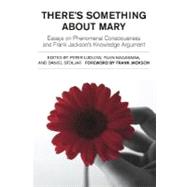Summary
In Frank Jackson's famous thought experiment, Mary is confined to a black-and-white room and educated through black-and-white books and lectures on a black-and-white television. In this way, she learns everything there is to know about the physical world. If physicalism-the doctrine that everything is physical-is true, then Mary seems to know all there is to know. What happens, then, when she emerges from her black-and-white room and sees the color red for the first time? Jackson's knowledge argument says that Mary comes to know a new fact about color, and that, therefore, physicalism is false. The knowledge argument remains one of the most controversial and important arguments in contemporary philosophy. There's Something About Mary-the first book devoted solely to the argument-collects the main essays in which Jackson presents (and later rejects) his argument along with key responses by other philosophers. These responses are organized around a series of questions: Does Mary learn anything new? Does she gain only know-how (the ability hypothesis), or merely get acquainted with something she knew previously (the acquaintance hypothesis)? Does she learn a genuinely new fact or an old fact in disguise? And finally, does she really know all the physical facts before her release, or is this a "misdescription"? The arguments presented in this comprehensive collection have important implications for the philosophy of mind and the study of consciousness.
Author Biography
Peter Ludlow, Professor of Philosophy at the University of Toronto, is the author of Semantics, Tense, and Time: An Essay in the Metaphysics of Natural Language (MIT Press, 1999), among other books, and the editor of Crypto Anarchy, Cyberstates, and Pirate Utopias (MIT Press, 2001) and High Noon on the Electronic Frontier (MIT Press, 1996).
Yujin Nagasawa is Research Fellow at the Australian National University and Izaak Walton Killam Memorial Postdoctoral Fellow at the University of Alberta.
Daniel Stoljar is Professor of Philosophy at Australian National University.
Table of Contents
| Acknowledgments |
|
ix | |
| Sources |
|
xi | |
| Contributors |
|
xiii | |
| Foreword: Looking Back on the Knowledge Argument |
|
xv | |
|
|
|
| Introduction |
|
1 | (36) |
|
Daniel Stoljar and Yujin Nagasawa |
|
|
| Part I Black-and-White Mary |
|
37 | (20) |
|
|
|
39 | (12) |
|
|
|
|
|
|
51 | (8) |
|
|
|
| Part II Does She Learn Anything? |
|
57 | (18) |
|
3 "Epiphenomenal" Qualia? |
|
|
59 | (10) |
|
|
|
|
4 Dennett on the Knowledge Argument |
|
|
69 | (8) |
|
|
|
| Part III The Ability Hypothesis |
|
75 | (86) |
|
5 What Experience Teaches |
|
|
77 | (28) |
|
|
|
|
6 Motion Blindness and the Knowledge Argument |
|
|
105 | (38) |
|
|
|
|
7 Knowing What It Is Like: The Ability Hypothesis and the Knowledge Argument |
|
|
143 | (20) |
|
|
|
| Part IV The Acquaintance Hypothesis |
|
161 | (56) |
|
8 Knowing Qualia: A Reply to Jackson (with Postscript: 1997) |
|
|
163 | (16) |
|
|
|
|
9 Acquaintance with Qualia |
|
|
179 | (18) |
|
John Bigelow and Robert Pargetter |
|
|
|
|
|
197 | (20) |
|
|
|
| Part V Old Facts, New Modes |
|
217 | (82) |
|
11 Phenomenal States (Revised Version) |
|
|
219 | (22) |
|
|
|
|
12 What Mary Couldn't Know: Belief About Phenomenal States |
|
|
241 | (28) |
|
|
|
|
13 Phenomenal Concepts and the Knowledge Argument |
|
|
269 | (30) |
|
|
|
| Part VI Did She Know Everything Physical? |
|
299 | (108) |
|
14 Jackson on Physical Information and Qualia |
|
|
301 | (8) |
|
|
|
|
15 Two Conceptions of the Physical |
|
|
309 | (24) |
|
|
|
|
16 Inexpressible Truths and the Allure of the Knowledge Argument |
|
|
333 | (32) |
|
|
|
|
17 So Many Ways of Saying No to Mary |
|
|
365 | (42) |
|
|
|
| Part VII Postscripts |
|
407 | (36) |
|
|
|
409 | (8) |
|
|
|
|
|
|
417 | (4) |
|
|
|
|
|
|
421 | (22) |
|
|
|
| Supplemental Bibliography |
|
443 | (14) |
| Index |
|
457 | |

